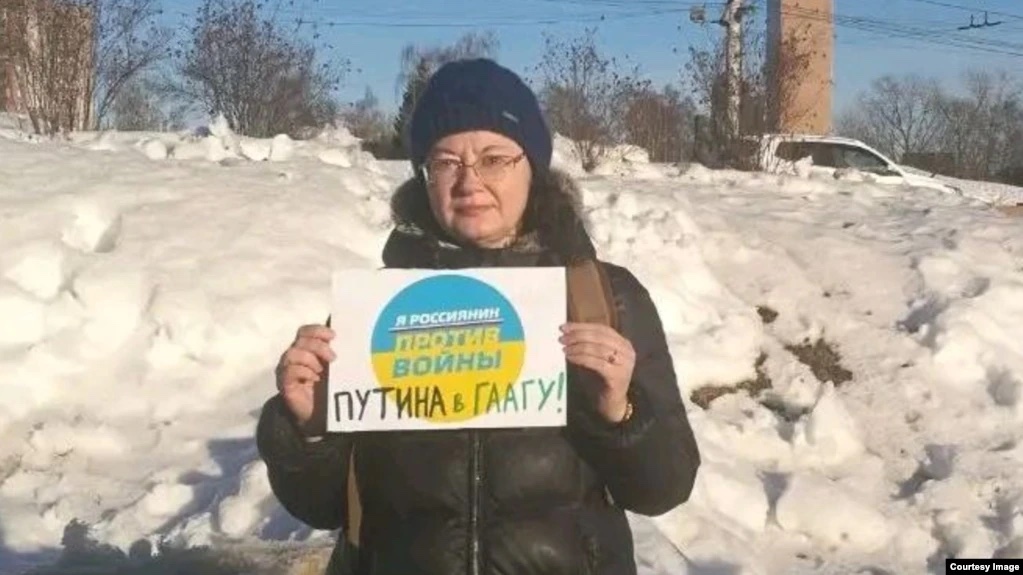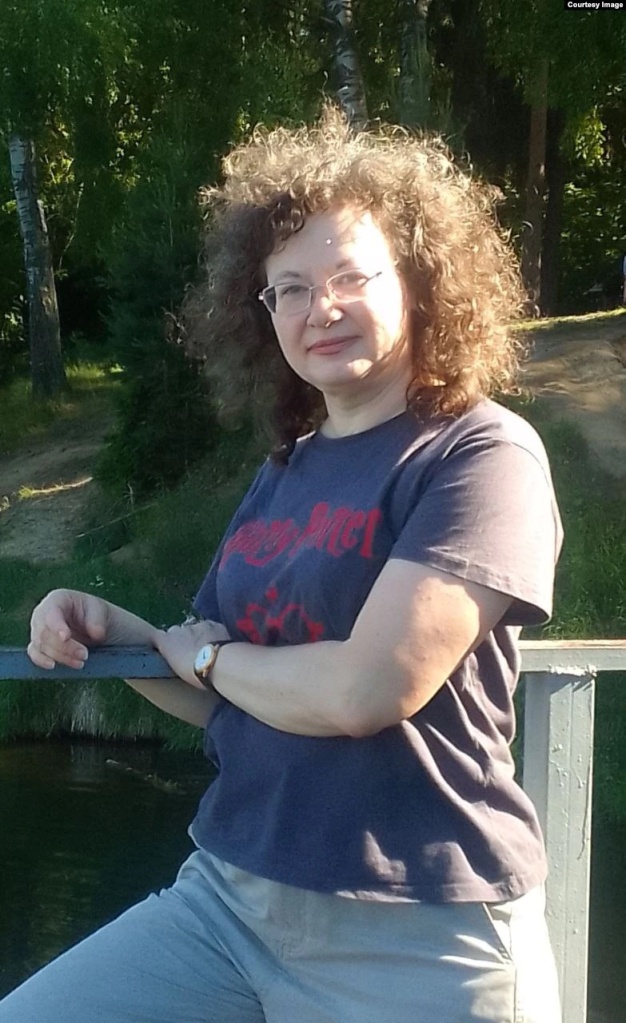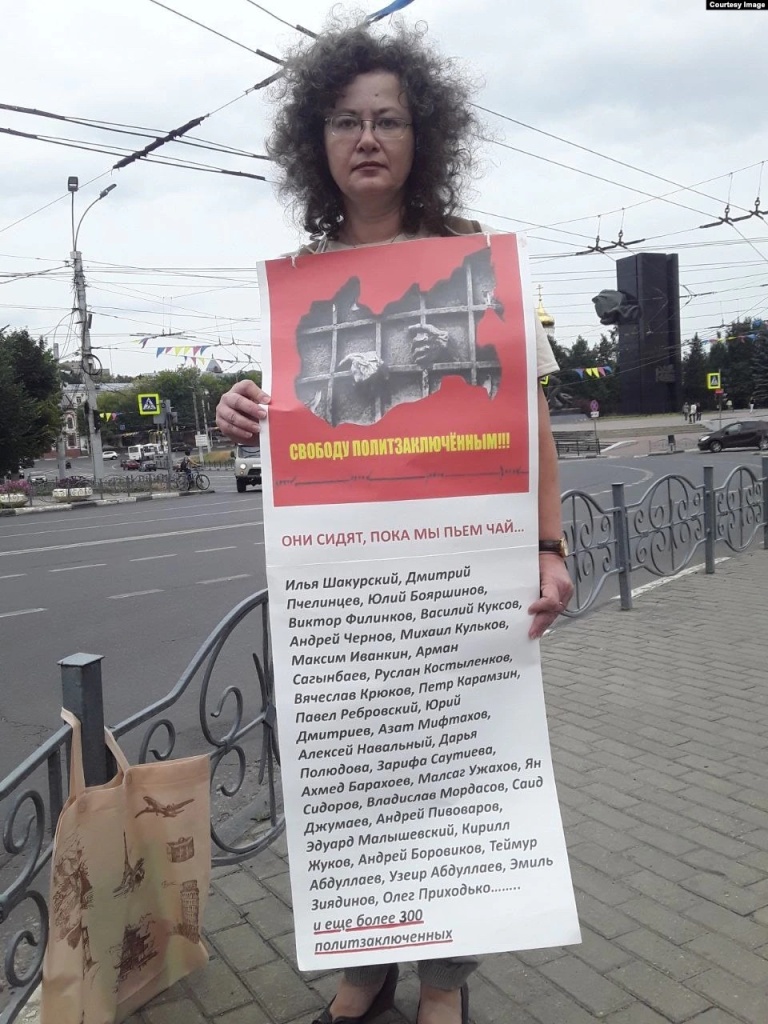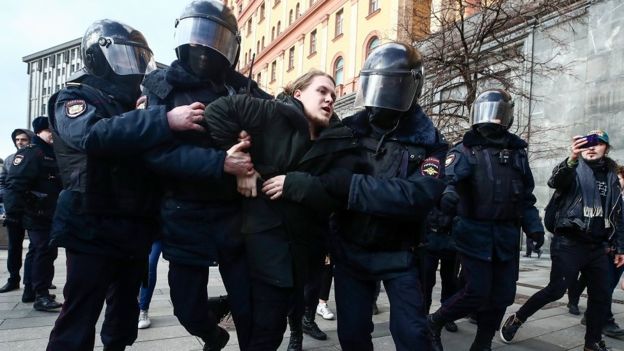The wife of a Russian soldier killed in action recorded a video message.
I would like to tell this story, if possible, from the very beginning. My name is Maria Ishkova, and I’m from St. Petersburg. I’m an absolutely genuine, living person. I’m no agent engaged in PSYOP.
All in all, my husband had been mobilized and deployed in the field with the Russian federal armed forces since September 2022, with periodic withdrawals [from the front] for rest and relaxation. But he had only one [home] leave during that whole time.
But none of that matters because yesterday—or rather, today—I learned that my husband passed away yesterday.
And that’s not all. The big thing I want to tell all the people who are fighting for the men they love—for their love, for their heart, for their life, for their fate—is that you’re out of time. You’re completely out of time because any day may be the fateful one.
I also want to say that I’ve now arrived in those selfsame new territories. I’ve come for my husband to Berdiansk, in the Zaporizzhia Region. And you know, I want to tell you that the people here have no need of [the war], no one has any need for it.
The people we love are simply getting killed for nothing. They’re of no worth to anyone.
I want to say that today—precisely today because I found out about it—my mind has split in two. One part of my mind, the lower part, it understands this grief, it grieves, it feels like weeping—all that stuff.
The second part of my mind, which has split off, it looks at all this a little bit from above and tries to understand how the world order could let such things happen.
And you know, I think that we ourselves are probably to blame for everything. I think that we let it happen by taking the minimal civic stance that we did—when each of us says, I don’t get involved in politics, it doesn’t interest me, it doesn’t worry me.
Each of us lived in this little world—where nothing mattered, where politics was decided by itself, where things happened of their own accord.
Now we find ourselves in a situation in which, basically, the chickens have home to roost because of our world view, because of our outlook on life. We were indifferent to these things, and now these things have devoured us.
The BBC and Mediazona have been able to ascertain the names of at least 40,000 Russians killed in Ukraine.
“Bring back my husband. I’m fucking tired of this shit.”
All over Russia, the wives and relatives of mobilized soldiers have been organizing protests to demand that their loved ones be returned home.
Source: Current Time TV (Instagram), 2 January 2024. Translated by the Russian Reader
I’m standing next to the Russian Defense Ministry. I’m doing a solo picket in the hope that we, the wives and mothers of mobilized men, will be heard. [I hope that] our pain will be heard, that our request to bring our husbands [and] our boys back home will be heard.
They are tired. They’ve been deployed in the special military operation zone for a year and four months with no rotation.
Personally, my husband has been sent on the attack. He has a master’s in applied physics. He works in IT. He has a child who is one and a half years old. When he was [mobilized], the child was three months old. But now he’s on the attack. People like him shouldn’t be sent on the attack.
Generally, all the mobilized men should be brought home: they need to rest. We demand that the period of mobilization of no more than a year be restored.
That’s why I’m here today, and I expect to be heard.
And what else do you plan to do if you’re not heard?
We’ll keep on going. We’ll continue to fight for our boys because we don’t really have a choice. Each time there are more and more of us. More and more wives, mothers, and sisters are beginning to understand that their inaction could get their husbands or brothers killed.
You don’t have as much time as you think you do. Every days could be the decisive one, the last one.
How long are you going to stand here?
I’m probably going to stand here until I’m finally frozen. Because the weather outside is frightful, to be honest. But I also know that my husband is facing even worse conditions, and the fact that I’m standing here in the cold for an hour or two cannot be compared with the fact that for a year and four months he has faced simply inhumane conditions without being relieved, and now, to make matters worse, he’s on the attack.
I’m not afraid to talk about it. I’m not afraid to fight because the worst thing that could happen has already happened.
Source: SOTA (Twitter), 6 January 2024. Translated by the Russian Reader
Nevertheless, if we disregard volunteers, prisoners and mercenaries, we can say with a high degree of certainty that by the beginning of 2024 the Russian armed forces will not have recovered the number of contract-based personnel that they had on the eve of February 2022. This is indirectly evidenced by other figures cited by the Kremlin: approx. 244,000 military personnel are officially at war today, while 650,000 people have gained combat experience since February last year, 458,000 of whom have already received certificates confirming their status as combat veterans. This, of course, includes both regular servicemen and mobilised personnel from various combat units, as well as those serving in the navy and combat support units, ground staff of military airfields, etc., servicemen of the Rosgvardia and Federal Security Service (FSB), mercenaries and volunteers, military personnel from the Donetsk and Luhansk People’s Republics, as well as police officers. And apparently, these 650,000 veterans include all: the living, the dead, the missing, the captives and the disabled.
And given the Russian servicemen’s numerous complaints about the lack of rotation, it is not clear—even taking all the losses into account—where the claimed 490,000 new contract soldiers could have dissolved, alongside the unclear number of ‘old’ contract soldiers and the remaining mobilised troops. Simply put, the figures on paper have ultimately diverged from the actual number of people in Russian troops.
Female activists calling for the return of mobilized Russians from Russia’s war against Ukraine held a series of solo pickets in Moscow. The actions took place near the presidential administration offices and the Defense Ministry, according to a post on the Telegram channel of the movement The Way Home (Путь домой) on Saturday, January 6.
None of the picketers were detained. According to a female activist who picketed outside the offices of the presidential administration, a Federal Protective Service called the police, but the latter, after arriving at the site, confirmed that solo pickets were a legal form of protest.
At the same time, SOTA notes that about fifteen wives of mobilized Russians laid flowers at the Tomb of the Unknown Soldier near the Kremlin. According to SOTA, five relatives of mobilized men laid flowers at the Eternal Flame in St. Petersburg, demanding the return of their loved ones from the front.
Calling for the return of mobilized men home
Wives of mobilized Russians have been increasingly active in recent months in demanding the return home of men who have been at the front for over a year. They have been holding flash mobs, going to protest rallies, and sending official letters to the authorities, demanding that the tour of combat duty for mobilized men limited to one year, that all wounded men be discharged, and that the list of illnesses for which they cannot be drafted be expanded.
The leaders of many regions have refused to allow relatives to hold protest rallies, citing the threat of COVID-19. The Kremlin has practically not commented on their demands.
At the end of 2023, the Russian Defense Ministry turned down a request by Boris Vishnevsky, a member of the St. Petersburg Legislative Assembly, to limit the tour of duty of mobilized Russians to one year. Their tour of duty will end as soon as the country’s President Vladimir Putin signs a decree ending the mobilization, the ministry explained. At the same time, presidential spokesman Dmitry Peskov said on 1 November 2022 that Putin’s decree was not required to end the mobilization.
Source: Pavel Mylnikov, “Wives of the mobilized hold solo pickets in Moscow,” Deutsche Welle Russian Service, 7 January 2024. Translated by the Russian Reader
Maria Ishkova (above) and the young female solo picketer featured in the second part of this post both make appearances in this film.
Russia mobilized 318,000 men for its war against Ukraine, according to Vladimir Putin. The so-called partial mobilization was announced in September 2022, six months after the start of Russia’s invasion of Ukraine. Many mobilized men and their relatives believed that the mobilization would be for a relatively short period of time, up to six months, although no official announcement was made.
Almost a year later, in August 2023, The Way Home movement emerged in Russia, uniting relatives of mobilized soldiers. Several female activists who had met in one of the numerous online groups for the wives and mothers of Russian soldiers decided to move from talk to action and created a chat room to coordinate their efforts. Initially, most of the chat room participants were loyal to the government and avoided politics. Over time, they realized that the mobilized soldiers were not going to be brought home, the local authorities were making empty promises, and the topic was taboo to the federal press, and so the activists turned to public protests to make themselves heard. They have refrained from criticizing the government’s decisions and the war itself, focusing on the sole goal of bringing the mobilized men back home.
On 7 November 2023, a group of women armed with placards attended a Communist Party rally on Manezhnaya Square in downtown Moscow. On December 7, the movement published a collective manifesto demanding demobilization. The Way Home became the talk of the town, and the community began growing rapidly while also coming under increasingly harsh attacks. Opponents of the war ridicule those who did not dodge the draft and obediently reported to military recruitment centers. Supporters of the war have declared the female activists “Navalny supporters. Television propagandist Vladimir Solovyov said that The Way Home was created by foreign special services for subversive activities. The community’s rallies are banned under the pretext of preventing the spread of covid, its female members and their husbands are visited by law enforcers, and The Way Home’s Telegram channel has been labeled “Fake.” (Pro-government blogger Ilya Remeslo said this was done after he filed a complaint.) Despite the pressure, the community continues to function.
Vladimir Sevrinovsky’s film Wives of the Mobilized tells the story of an activist in The Way Home who wished to remain anonymous.
Source: Signs of Life—Documentary Films by Radio Svoboda (YouTube), 5 January 2024. Annotation translated by the Russian Reader












 Police detained over forty activists during the protest on Lubyanka Square. Photo by Valery Sharifulin. Courtesy of TASS and BBC Russian Service
Police detained over forty activists during the protest on Lubyanka Square. Photo by Valery Sharifulin. Courtesy of TASS and BBC Russian Service According to Lev Ponomaryov, police roughed up protesters when detaining them. Photo by Valery Sharifulin. Courtesy of TASS and BBC Russian Service
According to Lev Ponomaryov, police roughed up protesters when detaining them. Photo by Valery Sharifulin. Courtesy of TASS and BBC Russian Service A photo of Lev Ponomaryov after his “rough handling” by police in Moscow on March 14, 2020. The photo was widely disseminated on Russian social media. Courtesy of
A photo of Lev Ponomaryov after his “rough handling” by police in Moscow on March 14, 2020. The photo was widely disseminated on Russian social media. Courtesy of 